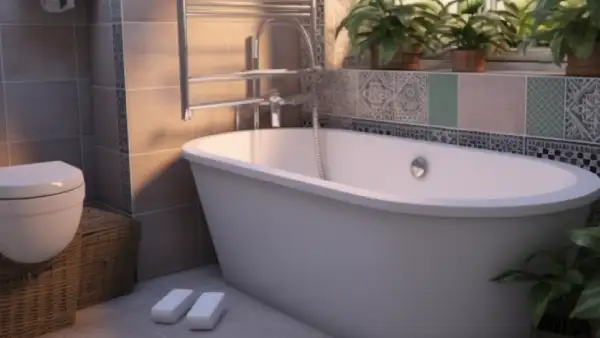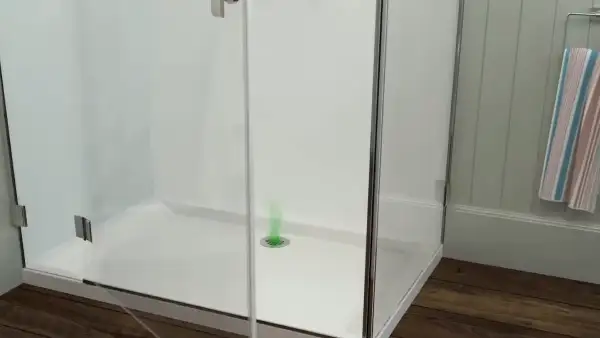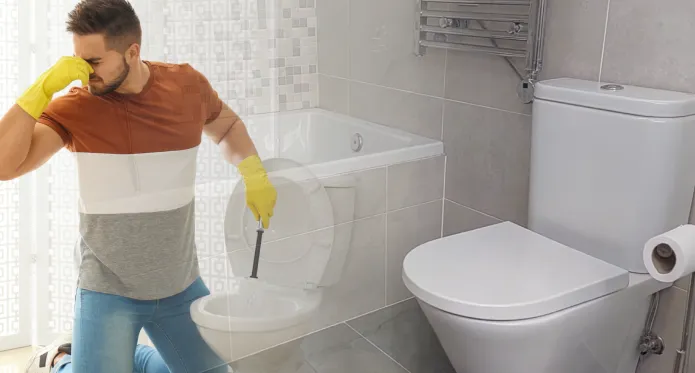Last Updated on November 14, 2023
The constant smell of cat urine in your bathroom is unpleasant and embarrassing if you have guests. The reasons behind a bathroom smelling like cat pee can be various, ranging from cat marking to mildew or biofilms.
But the most common reason could be cat urine residue from accidents or spraying. A dirty or improperly maintained cat litter box is also possible. Moreover, some mildew or biofilms in the bathroom can create a similar odor.
Throughout this article, we will explore the factors that can contribute to this issue and provide some tips on preventing it from happening again. So, let’s get to the bottom of this mysterious odor.
Why Does My Bathroom Smell Like Cat Pee: Obvious & Possible Reasons

If you’re wondering why your bathroom smells like cat pee, there are a few obvious and possible reasons to consider.
- Sewer gasses
- Cat urine residue
- Cat litter box
- Cat marking
- Mildew or biofilms
- Unsealed grout and tile
1. Sewer Gasses
If you notice a funky odor in your bathroom that smells like cat pee, it can be off-putting and concerning. The smell of cat pee can actually be caused by a buildup of sewer gasses that contain a mixture of sulfates and other organic compounds.
2. Cat Urine Residue
Cat urine contains strong-smelling compounds that can penetrate porous surfaces and linger long. If you have a cat and they’ve had accidents in the bathroom, the odor may still be present even after cleaning.
3. Cat Litter Box
Keeping your cat litter box in the bathroom is common, but it can also lead to odor issues if not maintained properly. The urine smell from the litter box can overpower the bathroom, making it an unpleasant space. Hence, regular litter box maintenance is key to preventing its odor.
4. Cat Marking
Cats use urine markings to establish their presence and protect their territory. This behavior is quite common in cats, especially if they feel threatened by other animals or their living situation changes. When a cat marks its territory, it is usually in small amounts, but the odor can be strong and unpleasant.
5. Mildew or Biofilms
If you notice a persistent cat urine smell in your bathroom without having pets, it could be due to mildew or biofilms, contributing to the unpleasant odor. You may be dealing with Serratia Marracens, a sneaky little bacteria that smells bad and can harm your health.
Conversely, if you’re dealing with a smell described as similar to cat urine, you might be dealing with Stachybotrys. This fungus produces a toxin called trichothecene, which can have serious health effects if exposed for extended periods.
6. Unsealed Grout and Tile
Unsealed grout and tiles can absorb urine and other liquids, creating a breeding ground for bacteria and causing unpleasant smells. Sealing your grout and tiles creates a protective barrier that prevents liquids from penetrating the porous surfaces, facilitating cleaning and eliminating odors.
Tips For Preventing Your Bathroom From Smelling Like Cat Pee
Several important steps are needed to keep your bathroom smelling fresh.
1. Clean the Litter Box Regularly
You should clean the litter box regularly to prevent your bathroom area from smelling like cat pee. Scooping the litter box at least once daily removes clumps and waste. This helps maintain a hygienic and odor-free environment. Also, replace the litter completely every 1-2 weeks, depending on your cat’s usage.
2. Use the Right Type of Litter
If you want your bathroom not to smell like cat pee, there are a few steps you can take. Make sure to use the appropriate type of litter. Choosing a clumping litter that effectively absorbs and traps odors is key.
Look for litters that have activated carbon or baking soda, as these ingredients help to neutralize odors. Avoid scented litters, which may not effectively mask the smell, and some cats may dislike the strong scent.
3. Place the Litter Box Strategically
Position the litter box strategically to prevent your bathroom from smelling like cat pee, so your cat can easily access it without disruptions. You can place it in a well-ventilated area to allow proper air circulation and prevent the accumulation of unpleasant odors.
4. Maintain Proper Litter Depth
Keep the litter at the proper depth and consistently maintain it so your bathroom doesn’t smell like cat pee. Aim for a depth of about 2-3 inches.
5. Consider a Litter Box With a Lid or Hood
Use a covered litter box to help prevent your bathroom from stinking like cat pee. Covered litter boxes, also known as litter boxes with a lid or hood, provide an enclosed space for your cat to do their business. The lid helps contain odors, preventing them from spreading throughout your bathroom.
6. Use an Enzymatic Based Cleaner
If you’re struggling with persistent urine odors in your bathroom, consider using an enzymatic cleaner to break down and eliminate the smell effectively.
Enzymatic based cleaners are uniquely formulated to target and break down the urine odor. They contain enzymes that react with the organic substances in urine, effectively neutralizing the odor.
Why does my bathroom stink like cat pee after a shower?

Check if the shower drain is clogged to determine why your bathroom smells like cat pee after taking a shower. A clogged drain can cause water to accumulate, leading to mold and bacteria growth, which emit unpleasant odors.
Start by inspecting the drain cover for any visible debris or hair blocking the water flow. If you find any, remove it using gloves or a small tool.
Next, use a plunger to try and dislodge any stubborn clogs. If the smell persists, you may need a chemical drain cleaner specifically designed for shower drains. Follow the instructions carefully and ensure proper ventilation.
Can a gas leak smell like cat urine?
A freon gas leak, specifically, can emit a smell that resembles cat urine. Freon, a type of refrigerant, has a distinct odor that can be described as a combination of sweets, ammonia, paint, or cat urine. This smell is quite distinguishable, and it’s important to note it if you come across it.
Also, it’s worth mentioning that freon, as a gas, has been documented as a contributor to the destruction of the ozone layer. So, if you ever detect a cat urine-like smell in your surroundings without pets, it would be wise to investigate for a possible gas leak and take the necessary precautions.
Regularly Clean and Keep Your Bathroom Space Smelling Fresh
Don’t let cat pee odors ruin your bathroom experience. Proper maintenance and cleaning can prevent the unpleasant smell and ensure your bathroom smells fresh and clean.
Remember to clean the litter box regularly. Use the right type of litter, select a litter container with a lid or hood, and use enzymatic cleaners for accidents outside the litter box.
Also, watch for leaking pipes and seal any porous surfaces to prevent urine odors from lingering. Follow these tips, and your bathroom will smell fresh and clean.

